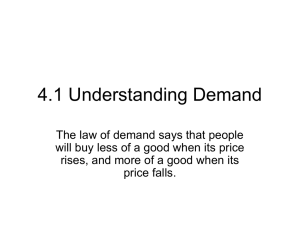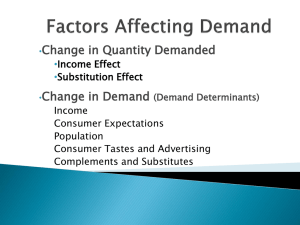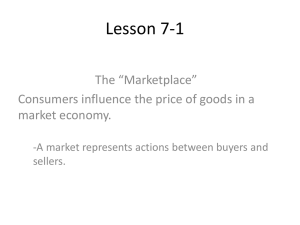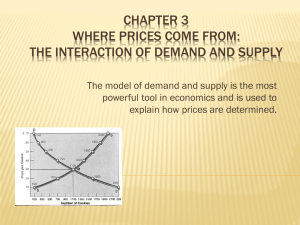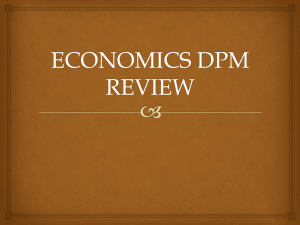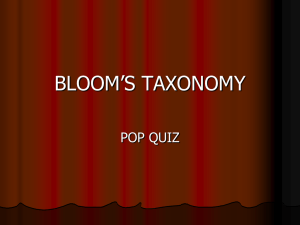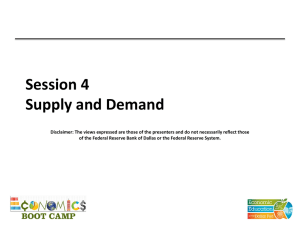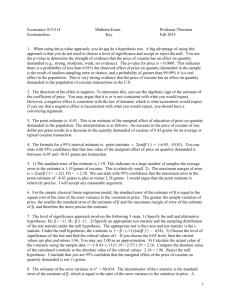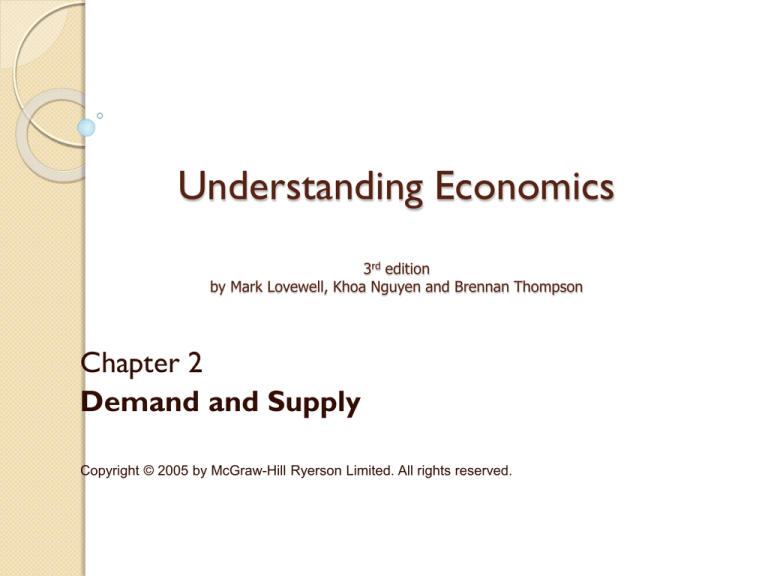
Understanding Economics
3rd edition
by Mark Lovewell, Khoa Nguyen and Brennan Thompson
Chapter 2
Demand and Supply
Copyright © 2005 by McGraw-Hill Ryerson Limited. All rights reserved.
Learning Objectives
In this chapter, you will:
1. consider the nature of demand, changes in quantity
demanded, changes in demand, and the factors that affect
demand
2. examine the nature of supply, changes in quantity supplied,
changes in supply, and the factors that affect supply
3. see how markets reach equilibrium – the point at which
demand and supply meet
What Is Demand?
o
Demand is a relationship between a
product’s price and quantity demanded.
• Demand is shown using a schedule or curve.
• The law of demand states that price and
quantity demanded are inversely related.
• Market demand is the sum of quantities
demanded by all consumers in a market.
The Demand Curve
Figure 2.1, page 29
Your Demand Curve for Strawberries
Your Demand Schedule
for Strawberries
Point
on
graph
$2.50
7
a
2.00
9
b
1.50
11
c
Price ($ per kg)
Price
($ per kg)
Quantity
Demanded
(kg per month)
a
2.50
b
2.00
c
1.50
D
1.00
0.50
0
1
3
5
7
9
11
Quantity Demanded
(kg per month)
13
Deriving Market Demand
Figure 2.2, page 31
2.50
2.00
1.50
1.00
D0
0.50
Friend’s Demand Curve for Strawberries
Price ($ per kg)
Price ($ per kg)
Your Demand Curve for Strawberries
You
Friend
Market
($ per
kg)
(D0)
(D1)
(Dm)
$2.50
2.00
1.50
(kg per month)
1
2
3
2
3
4
3
5
7
1.50
1.00
D1
0.50
Market Demand Curve for Strawberries
Price ($ per kg)
Price
2.00
5
0
1
2 3 4
6 7
Quantity Demanded (kg per month)
0
1 2 3
7
5 6
4
Quantity Demanded (kg per month)
Individual and Market Demand
Schedules for Strawberries
2.50
2.50
2.00
Dm
1.50
1.00
0.50
0
1
2
3
4
5
6
7
Quantity Demanded (kg per month)
Changes in Demand (a)
Changes in demand:
◦ are shown by shifts in the demand curve
◦ are caused by changes in demand
determinants
◦ This is when price remains unchanged, the
demand for the item changes
◦ Demand changes due to other factors besides
price of that item
◦ This is when consumers demand more at
each possible price
Changes in Demand (b)
Figure 2.3, page 32
Market Demand Curve for Strawberries
Market Demand Schedule
for Strawberries
$2.50
2.00
1.50
Quantity Demanded
(millions of kg)
(D2)
(D0) (D1)
5
7
9
7
9
11
9
11
13
Price ($ per kg)
Price
($ per
kg)
2.50
2.00
1.50
D2
D0
D1
1.00
0.50
0
1
3
5
7
9
11
13
Quantity Demanded
(millions of kg per year)
Demand Determinants (a)
Demand determinants include the
following factors:
◦ The number of buyers (baby boom increases
demand for diapers)
◦ Income
For normal products, an increase causes a rightward
demand shift.
For inferior products, an increase causes a leftward
demand shift.
Demand Determinants (b)
Prices of other products
◦ For substitute products, a rise in the other
product’s price causes a rightward demand
shift.
◦ For complementary products, a rise in the
other product’s price causes a leftward
demand shift.
Demand Determinants (b)
Consumer preferences
◦
◦
Apples are found to cure cancer
Latin music becomes more popular increasing
demand for Latin CDs
Consumer expectations
◦
Gas prices are expected to increase next
week, causing consumers to demand more of
it this week
Changes in Quantity Demanded (a)
Changes in quantity demanded:
◦ are shown by movements along demand
curve
◦ are caused by price changes of that product
or service
Changes in Quantity Demanded (b)
Figure 2.4, page 33
2.00
a
b
1.50
1.00
D0
0.50
0
5000 6000
Quantity Demanded (pairs of skis)
Change in Demand
Price ($ per pair of skis)
Price ($ per pair of skis)
Change in Quantity Demanded
2.00
1.50
1.00
D0
D1
0.50
0
5000
Quantity Demanded (pairs of skis)
Change in Quantity Change in Demand
Demanded
Movement from one
point to another
point – from one
price-quantity
combination to
another – on a fixed
demand schedule or
demand curve
A change in the
quantity demanded
of a good or service
at every price
Change in Quantity Change in Demand
Demanded
Buyers buy more
because the price fell
Buys buy more even
at the same price
Is the law of demand ever broken?
Veblen Effect
◦ An extremely rare situation where the
relationship between product’s price and
quantity demanded is directly related
◦ This may happen when the product price is
seen as a status symbol – thus high price leads
to more quantity demanded

